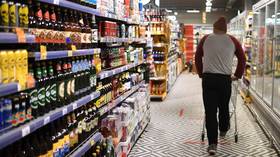Russian MP calls for ban on Western beer

Beer from ‘unfriendly countries’ should be added to Russia’s list of blacklisted goods, MP Aleksey Didenko has said in a proposal to Prime Minister Mikhail Mishustin, Izvestia reported on Tuesday.
Germany, Latvia, and Lithuania have become the top exporters of beer to Russia, though all three have taken a strong stance against the country in the international arena.
“Beer is an important export for Germany… hostile countries are increasing the deliveries of the beverage into our country and making tens of millions of dollars, the tax revenues from which go towards supporting the Ukrainian army, among other things,” Didenko argued.
Germany is the largest source of imported beer in Russia. It accounted for more than a third of all beer imports in 2022 and 2023, media reported earlier this month. Compared to 2022, the volume of the imports grew by almost a third in 2023, reaching $96 million.
The second largest, Lithuania, accounted for just over 15% of total beer imports in 2023, at $36.5 million, nearly double of what it exported in 2022. Latvia, the third largest, quadrupled the amount over the past year to $34.4 million.
“It turns out that these countries sharply criticize Russia, support economic sanctions, but make money on us,” the MP said, adding that blacklisting these suppliers will only benefit the Russian economy.
“Firstly, imported goods in this field only amount to 6% of the market. Secondly, this way we would support our domestic producers, and thirdly, allow the opportunity for suppliers from friendly countries to get on our shelves,” Didenko stated in his proposal. He believes the counter-sanctions would be a blow to the ‘unfriendly countries’, as well as support for Russian brewers, which have previously complained about foreign price fixing.
Moscow first introduced restrictions against certain foreign goods in 2014, in response to Western sanctions imposed following Crimea’s referendum to join Russia. Since then, the Russian authorities have expanded the blacklist and extended the duration of the counter-sanctions, most recently last September, to the end of 2024.













